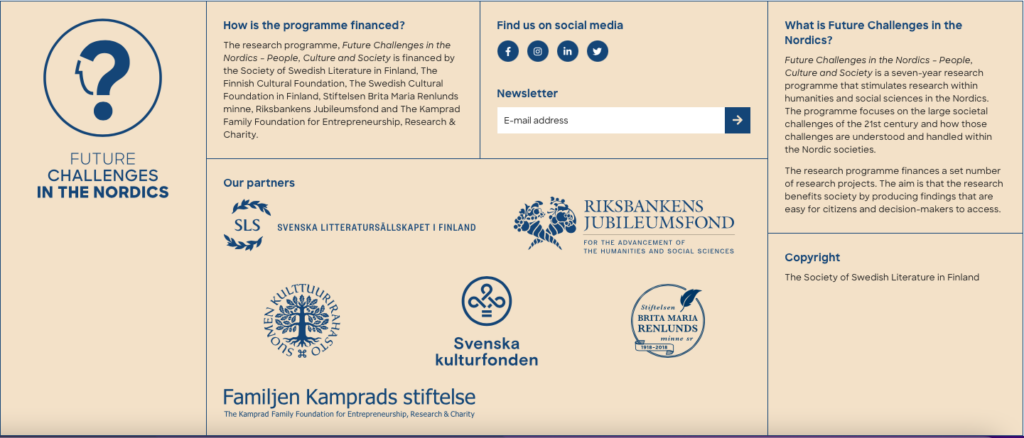On December 13, 2021 we got to know that our project “Opening the Contention between Openness and Security at Nordic borders: Studying surveillance practices at three Nordic states” was among the 11 projects that were granted funding within the programme Future Challenges in the Nordics.
Future Challenges in the Nordics is a seven-year research programme that stimulates research within humanities and social sciences in the Nordics. The programme focuses on the large societal challenges of the 21st century and how those challenges are understood and handled within the Nordic societies and is funded by a coalition of funders, led by the Society of Swedish Literature in Finalnd and including The Swedish Cultural Foundation in Finland, The Finnish Cultural Foundation and Stiftelsen Brita Maria Renlunds minne, Riksbankens Jubileumsfond and The Kamprad Family Foundation.
Out of the 449 applications received, through a rigorous scientific review process, 11 applications were granted funding. All the projects take an interdisciplinary approach to current questions in the Nordics, many of them looking at the changes and renewal of different aspects of the Nordic welfare model. Each project includes at least two Nordic countries and around 30 research disciplines are represented.
Our project departs from the Nordic countries’ vision of becoming the most open and most integrated region in the world. At the same time, the discourse about national security has increased and been strengthened in both public consciousness and political debate, not only in the Nordic countries, but also at the EU level, as global events like the 2015 refugee crisis and the covid-19 pandemic testifies. The undergoing introduction of the new Entry-Exit System (based on biometric control) at the EU level makes the relation between openness and security at inner and outer border even more timely and the role of increasingly advanced technologies central.
So, our project researches the tensions between Nordic openness and expectations of security that characterise the use of new forms of digital surveillance at the Nordic borders. The researchers will also study how existing standards and legislation, and changes in them, are taken into account in digital surveillance in the Nordic countries. The project will be carried out in three Nordic countries – Sweden, Norway and Denmark – and it’s divided into three parts. The first one will map out how digital surveillance looks from a historical perspective. The second one will focus on three case studies that examine how digital surveillance is done in practice at the Øresund Bridge, at airports (Kastrup in Denmark, and Skavsta and Landvetter in Sweden) and at the land border crossings between Sweden and Norway. The third one is based on the other two and consists of an exhibition with the aim of creating public debate and participation through so-called policy labs.
The team is led by professor Elena Raviola and hosted by the Academy of Art and Design, University of Gothenburg. Our team involves researchers with backgrounds in design studies, computer science, sociology, law, science and technology studies as well as organisation studies. The project has been granted 990,000 euros and will start in May 2022.

